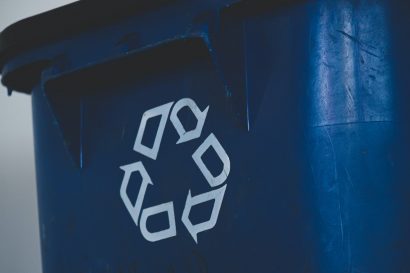AG INSIGHT | 28/07/2021
England needs to urgently accelerate the resource efficiency agenda to reach net zero

Kate Young, Senior Public Affairs Officer at the Aldersgate Group outlines the key actions required from government to accelerate progress on the resources and waste agenda.
The recent Dasgupta Review commissioned by the UK government illuminated how dependent wealth and productivity are on the exploitation of natural resources. From 1970 to 2017, the annual global extraction of materials grew from 27 billion tonnes to 92 billion tonnes, and it is expected to double again by 2060. Our demands on nature far exceed its capacity to supply them and this poses significant risk to the health and wellbeing of economies and societies.
The premise of a circular economy offers a solution to break the link between economic growth and unsustainable resource use. A circular economy is an alternative to our traditional linear economy – make, use, dispose – in which resources are kept in use for as long as possible, with maximum value extracted from them whilst in use. The transition to a circular model will be essential to halt the twin trends of biodiversity loss and climate change.
The Aldersgate Group’s recent report ‘Closing the Loop‘ sets out how critical circular economy measures will be critical to delivering the UK’s net zero and biodiversity goals, levelling up agenda, and economic recovery. Having engaged extensively with businesses, professional institutes and civil society organisations, the report highlights that despite holding significant short- and long-term wins for government, businesses and the environment, resource efficiency has been overlooked.
The expansive environmental and economic benefits that could be yielded from a circular economy are well-documented. Research has shown that action on resource efficiency could deliver 80 per cent of the additional emission savings required to deliver the UK’s Fifth Carbon Budget and deliver a net gain in Gross Value Added of £9.1bn by 2030. A more circular economy could also create more resilient and, where economically desirable, localised supply chains that are less prone to disruption in the event of global shortages or breakdowns in the supply of key materials.
Despite the vast breadth of potential, and demonstrable public support for circular economy measures that go beyond plastic and packaging concerns, UK government strategies on resource efficiency have to date lacked ambition, pace and detail. It is clear that the circular economy agenda has received limited buy-in from other government departments beyond the Department for Environment, Food and Rural Affair’s (Defra) extensive work in this area.
The UK government did outline a positive overarching vision in its 2018 Resources and Waste Strategy for England, proposing some crucial policy reforms – eco-design standards, Extended Producer Responsibility schemes, a Deposit Return Scheme, a plastics tax, and a National Materials Datahub. However, in the four years since, barely any progress has been made, with this year’s long-awaited Waste Prevention Programme predominantly restating many pre-existing policy commitments. Several policy proposals in the Programme also have voluntary status – such as the new agreement for textiles for example – despite previous voluntary schemes having exhibited poor performance and limited impact.
Existing legislation and target setting around waste and resources have also chiefly focused on the “end of the pipe” by promoting landfill diversion and recycling, instead of seeking to influence the inherent cause of waste in the consumption of goods and services. Remanufacturing, refurbishment, repair and reuse enable retention of the inherent value of products themselves, rather than just materials within a product as through recycling.
As the Climate Change Committee identified in the Sixth Carbon Budget, there are considerable opportunities to improve resource efficiency that are not being taken, even though they would reduce costs to consumers. Beyond consumer products, there is significant potential for resource efficiency savings in industrial processes and across all sectors of the economy. Consequently, resource efficiency must become a cross-government priority – beyond the efforts already led by Defra, with Treasury, the Department for Business, Energy and Industrial Strategy (BEIS), the Department for Transport and the Ministry of Housing Communities and Local Government (MHCLG) all actively contributing to policy progress in this area.
Firstly, the government should implement policies that were first proposed four years ago with pace and ambition. This includes in particular mandatory product standards and labelling schemes, ambitious fee modulation for Extended Producer Responsibility schemes, a wide-ranging Deposit Return Scheme and an escalator for the plastics tax. Secondly, new proposals are needed to plug policy gaps and tackle ongoing market barriers that are slowing the take-up of more resource efficient business models. It will be important to develop resource efficiency criteria for the £290bn a year spent by the UK on public procurement, introduce fiscal mechanisms – such as variable VAT rates – to make it easier for resource efficient products and materials to compete on cost, and reduce consumption in the first place, through citizen engagement campaigns and incentives for service-based business models.
The use of targeted public finance – for example through the new UK Infrastructure Bank – could play a critical role in attracting private investment in the additional infrastructure that is urgently needed to support greater rates of recycling, repair, remanufacturing and reuse. Finally, both a comprehensive strategy on low carbon skills and a supportive trade policy will be essential for an economy-wide drive towards greater resource efficiency.
Designing out waste and pollution, keeping materials in use, and regenerating natural systems will result in environmental benefits, generate significant economic returns, reduce our dependence on virgin resources and imports, boost local repair, remanufacturing, and upcycling economies, and better equip us to address climate change and exogenous shocks like Covid-19. There is a huge amount to gain from accelerating the resource efficiency agenda – all of government should act quickly to do precisely that.


